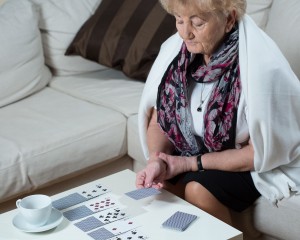Our guest blogger this week is Amy Brandwene, LMSW. She has a Certificate in Gerontology and MBA in Marketing from Fordham University. She has worked with older people and their families in skilled nursing environments, assisted living and continuing care retirement communities.
As the sun sets, anxiety increases for some elders with Alzheimer’s or other forms of dementia. That’s because of “sundowning,” a condition characterized by increased confusion and agitation which starts in the late afternoon or early evening and often includes nighttime wakefulness, aggression and wandering. The Alzheimer’s Association estimates that some 25% of people with dementia suffer from sundowning. It takes a huge toll on caregivers who must choose between care and vigilance and their own sleep, and so, is a leading reason for people with dementia to be placed in nursing homes.
 The Sarah Neuman Center at Jewish Home has introduced the NightCare program designed to comfort and engage elders with this level of dementia, and to provide respite for their caregivers. Offered several nights per week, from 7 PM to 7 AM, the NightCare program is staffed by experienced, caring professionals like Ruth Mederski, LPC. She explains, “At night when these seniors can become more anxious, we are there to give reassurance.”
The Sarah Neuman Center at Jewish Home has introduced the NightCare program designed to comfort and engage elders with this level of dementia, and to provide respite for their caregivers. Offered several nights per week, from 7 PM to 7 AM, the NightCare program is staffed by experienced, caring professionals like Ruth Mederski, LPC. She explains, “At night when these seniors can become more anxious, we are there to give reassurance.”
In additional to providing a caring and safe environment, the NightCare program offers activities designed to help these elders connect with others; conversation, games, and art, music and recreational programs can all be beneficial. For those who can participate, falls prevention and safe walking programs, as well as Tai Chi and elder-friendly yoga are available. There is a nurse who can administer medication, and if the elder also participates in the Adult Day program at Sarah Neuman, there is coordination between the day and night nurses.
The NightCare program at Sarah Neuman offers dinner after arrival, snacks and breakfast. The program will also include a caregiver support group to help families cope with the strain of dementia care.
Perhaps the most meaningful offering of the NightCare program is peace-of- mind for the caregiver. The son of one NightCare client has shared that “it’s a great relief knowing my mother is safe and cared for at night. I can sleep.”
For more information contact: Amy Brandwene, LMSW at Jewish Home’s Sarah Neuman Center in Mamaroneck, NY 914-864-5804. She is currently the social worker for the Sarah Neuman Center’s Day Center and NightCare program.
Learn more about our services by visiting www.elderlawnewyork.com.
Was this article of interest to you? If so, please LIKE our Facebook Page by clicking here.



